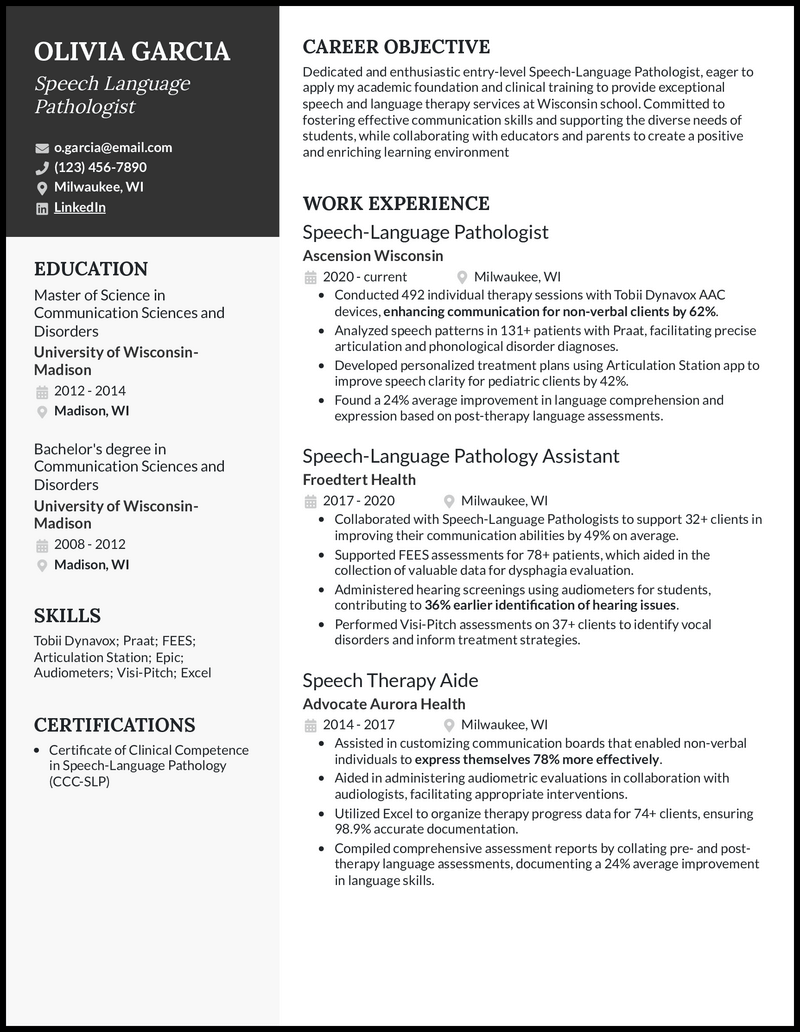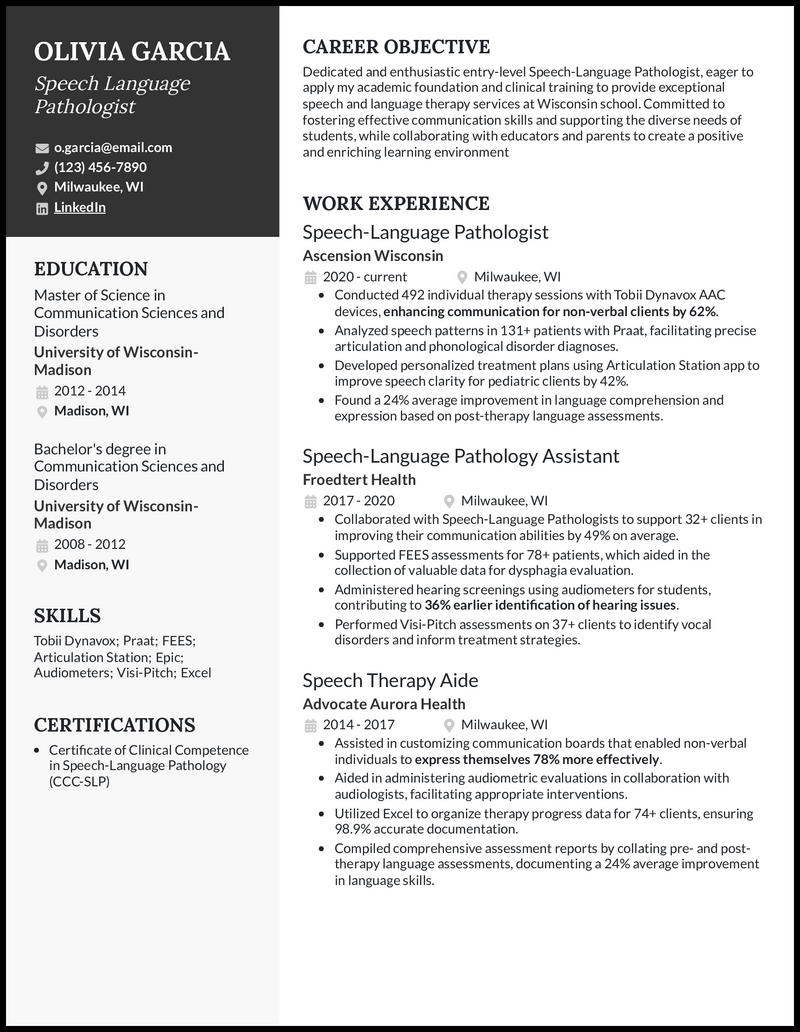When a patient’s speech, swallowing, language, or voice is affected, you’re there to diagnose them and help develop treatment plans. You also provide insight on whether speech or language therapy is necessary to help the patient communicate well.
But does your resume template help you adequately communicate your abilities so you can help others? What skills should you prioritize, and how do you stand out as unique?
No problem! We’ve helped plenty of people in your field before, and we’ve put together seven speech language pathologist resume examples to help you build up some momentum before generating a cover letter.
Why this resume works
- Before you can secure a speech language pathologist position, you need to hold certain qualifications. Showcase your Certificate of Clinical Competence (CCC-SLP) and Master of Science in Communication Sciences and Disorders clearly on your speech language pathologist resume.
Why this resume works
- So, you’ve exhausted relevant speech-language pathology experiences in your SLP CF resume. Let your educational background and industry-specific credentials be your cherry on top.
- Relevant degrees for this role would be in communications sciences and disorders and speech-language pathology. Also, credential from the American Speech-Language-Hearing Association is a welcome addition to your piece. Yet, don’t underestimate the subtle mention of the likes of Fluency and Fluency Disorders certification and Child Language and Language Disorders certification.
Why this resume works
- Speech language pathologists care for a wide range of disorders. If you’re looking to land a role working with auditory processing difficulties, then showing a background in that specific field will help you get there.
- Evidencing a background in audiology offices or working with communication disorders will enhance your speech language pathologist assistant resume.
Why this resume works
- Speech language pathology graduate programs are highly selective. To land a spot in one of these prestigious programs, you have to prove you’ve obtained relevant experience.
- Any project that helped you build skills like research or speech disorders belongs on your speech language pathologist graduate student resume.
Why this resume works
- For a medical SLP resume, maximize on cases when your interventions in language, speech, swallowing, and cognitive disorders fostered positive outcomes in a variety of medical settings.
- Sydney spearheading dysphagia sessions that boosts patient swallow functions at Spaulding and identifying language deficits and facilitating targeted interventions at Kennedy-Donovan are a perfect example of this resume hack. But as always, such outcomes are best backed up with genuine numbers.
Why this resume works
- Want to show you’re truly invested in helping people gain more confidence and fluency in their speech? Unleash those early career moments in your certified speech-language pathologist resume.
- From the part-time gigs at a local clinic, internship, or even volunteering work, these little experiences combined speak volumes about your dedication. It proves you’re in the speech game for to genuinely make a difference in lives—one word at a time.
Why this resume works
- A great way of showing you’re the go-to expert people rely on to find and maximize their voice’s potential is starting with an academic mic drop.
- A Master of Science in Communication Sciences and Disorders doesn’t just add credibility, it screams “I’m more than prepared to take on any type of speech disorder case.” Letting your education qualifications do the talking also instills more trust in employers and makes your contract speech-language pathologist resume nearly irresistible.
Related resume examples
Tailor Your Speech Language Pathologist Resume to the Job Requirements

Here’s a quick shortcut formula for you: Skills you possess + what the job description asks for = your skills list. It really is just that easy to create the first draft of your skills list, but then you’ll want to narrow things down further so that a single glance tells recruiters “Awesome speech language pathologist here”!
To hone your skills list to a compelling edge, think technically about your job: What exactly do you do during a day at work? You might use “communication skills,” but wouldn’t it be better to list “Patient Consultation” to show how you communicate with patients in a medical, digital setting?
And be specific about skills in terms of nuances alongside angling each skill in favor of your credibility as a speech language pathologist. If you have a favorite handful of software tools that get you through the day, name them.
Need some ideas?
15 popular speech language pathologist skills
- Language Assessment
- Speech Diagnosis
- Patient Interviews
- Zoom
- MS Teams
- Speech Studio
- Audiometer
- Epic
- Articulation Station
- Baby Babble
- Praat
- Speech Blubs
- Pure Tone Audiometer
- Active Listening
- Treatment Plans

Your speech language pathologist work experience bullet points
Now, while we strongly suggest referencing the job description for inspiration while writing your own speech language pathologist resume, don’t repeat any significant portions of it! Reflecting some of their values and working their most common keywords organically into your own experience points is totally different.
Recruiters want to see that you’ve created success in this field, not just that you’ve read the job requirements and repeated them. Leverage your past achievements and accomplishments to show your diagnostic capabilities or aptitude for treatment planning and consultation.
And don’t forget two really important components: Metrics and active language!
You’ll need to provide quantifiable data to back up your stories of successful patient outcomes and improved clinic ratings. And your experiences will sound much better when you set them off with active verbs that pack a punch!
- Percentages of patient improvement demonstrate your effectiveness.
- Personal ratings based on patient feedback show a great bedside manner.
- Patient referral or return rates show the appeal in your methods.
- Labor hours you’ve reduced with your efficiency make you more desirable.
See what we’re talking about?
- Orchestrated virtual Zoom meetings to facilitate 62% more seamless communication among team members across different time zones
- Utilized strong customer assistance skills to achieve a 97% customer satisfaction rate through quick resolution
- Assisted 33+ patients in improving speech clarity and communication skills through the use of Speech Blubs, increasing expressive language abilities by 53%
- Performed Visi-Pitch assessments on 37+ clients to identify vocal disorders and inform treatment strategies, achieving a 4.8/5-star rating
9 active verbs to start your speech language pathologist work experience bullet points
- Leveraged
- Performed
- Assessed
- Utilized
- Orchestrated
- Strategized
- Overhauled
- Provided
- Assisted
3 Tips for Writing a Speech Language Pathologist Resume if You Lack Much Experience
- Think of the internships!
- If you ever completed any internships, paid or unpaid, that helped pave the way to your role as a speech language pathologist . . . include them on your resume! If you gained relevant skills, previous work experiences don’t have to be jobs in the same field.
- Consider academic projects
- If you’re still not satisfied by the way your credentials look on your resume, you can add another section for academic projects related to your field or a relevant degree. As long as they relate to your current job goals and can provide the same details like context and metrics, they’re good!
- Get some references
- If you had any great academic experiences when you really connected with a professor or mentor, see if they’ll write you a professional reference. The same goes for former bosses or managers from previous jobs unrelated to speech language pathology, too.
3 Tips for Writing a Speech Language Pathologist Resume if You’ve Got Some Experience Already
- Exclude less relevant jobs
- Now that you have some nice-looking experience under your belt, you can get more selective about which jobs you include in your professional history. Limit yourself to just three or four of the most impressive jobs that will give you the best experience points to bolster your credibility as a speech language pathologist.
- Try a resume summary
- While entry-level applicants might choose a resume objective, you’re better off with a summary if you have plenty of experience. It might be just what you need to establish a personal connection with the company and stand out as extra-qualified when it’s time for interview calls!
- Use reverse-chronological formatting
- This resume format puts your most recent achievements at the top of the page, making them more likely to catch the reader’s eye. You can also leverage this layout to show a trend of growth by choosing care and diagnosis experience points that get increasingly complicated.
That depends on which of your qualification sections looks the most impressive! If your experiences in speech language pathology are incredible, put them right in the center spotlight. If you have a lot of other sections besides your skills and personal info, like “Internships” or “Awards,” try a column layout.
Honestly, if you’ve done enough research to formulate a solid skills section and frame your experiences according to the individual job listing, you’re probably good here. All the same, parse your resume to make sure there aren’t any other job-related keywords to work in.
Revisit the job description! Do they focus more on technical stuff like Speech Studio, or interpersonal niches like care planning and patient consultation? Reflect whatever skills they mention the most, both in your skills list and in your examples section.












